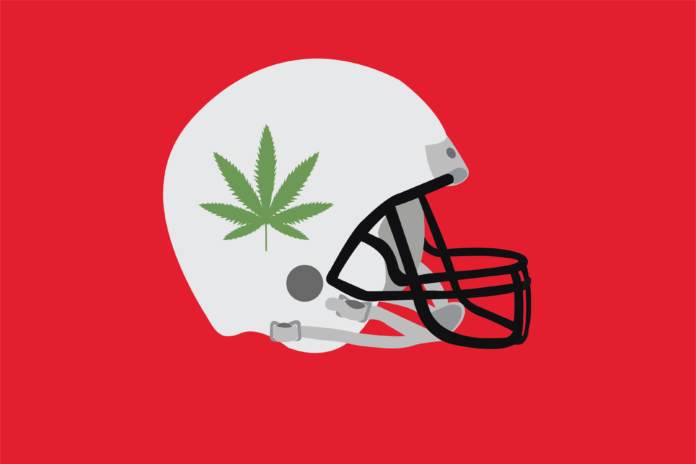The league owes it to its players to pursue any possibility of reducing impacts of a game this violent
Player health and concussions are the biggest problems facing the NFL today. They limit the longevity of players on and off the field and have created a public relations nightmare for the NFL. If players are playing a sport that increases the probability of permanent brain damage and potentially ages their brain by over 30 years, the NFL should be doing everything in its power to mitigate these issues. Luckily for the NFL, weed has emerged as a potential remedy.
Martellus Bennett estimated that 89% of NFL players already smoke weed in an interview with Bleacher Report. “There are times of the year where your body just hurts so bad,” Bennett said. “You don’t want to be popping pills all the time.”
For many players, marijuana is just a way to cope with the non-stop stress of the NFL season. Constant practicing, travel, rehabilitation and games create a hectic life for players. How are they supposed to allow their broken bodies to recover each week when they are expected to be in top shape every Sunday?
Weed, for many players, is becoming the only viable way for them to recover after their bodies break down with each game they play. After former No. 2 overall pick Chris Long retired this summer, he criticized the league’s drug policy. “We should be headed to a place where we allow players to use what I wouldn’t even call drugs.” Long said, in reference to marijuana. “It’s far less dangerous than players guzzling a fifth of alcohol and going out after a game.”
He’s absolutely right. Countless incidents have occurred in which NFL players earn DUIs and get into bar fights from drinking, but very few have had incidents while high on weed. Alternatives to weed — like pain medication and alcohol — are far more dangerous to NFL players. For example, Aquib Talib and Plaxico Burress shot themselves in the leg while inebriated.
Because of football’s inherently violent nature, this is a game that is always going to have a major concussion issue no matter what rules the league implements. If there is a substance that can help players reduce the effects of head trauma, then the league should pursue every opportunity to make it accessible for players.
Just last year, neurologists at the Dent Neurological Institute observed that cannabis relieved post-concussion symptoms in 80% of patients studied. The study indicates that weed can reduce the effects of concussions, so the NFL should not hesitate to act now and remove it as a banned substance.
In a recent interview with Sports Illustrated, former Lions wide receiver Calvin Johnson revealed that he smoked weed after every game to avoid opioid prescriptions, which are frequently overprescribed to both athletes and Americans in general. The NFL has a history of fueling the country’s opioid crisis by partnering with tobacco, alcohol and pharmaceutical industries. Trainers throw opioid prescriptions at everything, with “rogue trainers” supplying Adderall, Xanax and Ambien. Football is a game riddled with pain, and as a result painkillers are celebrated in the sport almost as much as vicious hits and violence are.
The NFL’s rules on weed seem archaic, but it’s not entirely the league’s fault. These matters are discussed in every new collective bargaining agreement — the current one is up for renewal before the end of the 2020 season — between the NFL and the NFL Players Union. Current players need to start speaking out about this issue if they want tangible change instead of just skirting around the NFL’s drug testing practices. It’s only a matter of time before the NFL caves.
Getting out in front of an obvious issue and unbanning weed could be a move similar to the NCAA’s recent endorsement decision. And the NFL would be celebrated for it. There are currently over 30 states that allow the use of legal marijuana for medical or recreational purposes — the NFL would just be joining the majority of the country.
Josh Gordon has been the poster child for weed-related discipline in the NFL. When Gordon finally got to the NFL he broke records in his second season, but his first team all-pro season would end up being the height of his achievements. Over the next two seasons, Gordon would receive two separate indefinite suspensions for failed drug tests. Gordon is the perfect example of all of the conflicting issues the NFL has right now. He is an explosive player who has talent that few receivers have ever possessed. However, because the NFL has been such sticklers against weed, the league squashed what could’ve been the prime of his career.
In a game that creates brutal violence on the field every week, it seems obvious that the NFL would do anything in its power to relieve the pain of its players. The fact that the NFL hasn’t is a major failure on its behalf. The league must limit restrictions on weed so that its players have the opportunity to recover from the brutality they face every Sunday.
Written by: Calvin Coffee — cscoffee@ucdavis.edu
Disclaimer: The views and opinions expressed by individual columnists belong to the columnists alone and do not necessarily indicate the views and opinions held by The California Aggie






You are over-selling your point, at least in the title. As you note, the most glaring problem is brain damage, but weed will not be able to repair any of that. It can alleviate the symptoms, which is great, but that is far from an answer.